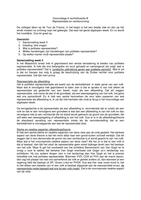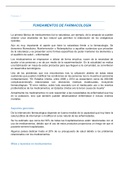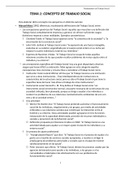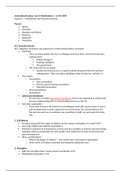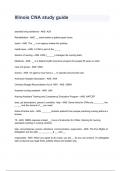Week 4 Hoorcollege Concernrecht
De meeste groepen opereren in concernverband.
De vier groepsbegrippen
• Dochtermaatschappij
• Groepsmaatschappij
• Deelneming
• Afhankelijke maatschappij
• Groepsbegrippen buiten boek 2 BW (hier houden wij ons niet mee bezig)
Bestuurszelfstandigheid
• Probleem
• Concernbelang?
• Corus
• Art. 129 lid 4 BW
• Voorstel Flexwet
• Oplossing?
Stel je bent adviseur van een BV. Alle aandelen worden gehouden door een UK vennootschap. Deze
houdt niet alleen aandelen in jouw BV, maar ook heel veel anderen. Nederlandse BV is dus klein
onderdeel. De NLe BV heeft een directeur. Het concern is bezig met een groot krediet te fixen,
banken willen natuurlijk zekerheid. Nle BV moet garant staan. Aan jou wordt gevraagd of directeur
moet tekenen of niet? Is link, want als het misgaat valt jouw tent om. Maar als je zelf ook iets van
zekerheid krijgt. Bestuurders moeten handelen in het belang van hun onderneming, als het niet in
het belang is, kun je beter niet tekenen. Als hij niet tekent, wordt hij waarschijnlijk uit het concern
gegooid bij de volgende AvA. Moeilijke positie voor Piet.
Dit probleem is neergelegd in het arrest Forumbank, uit 1955. NV Forumbank met 2
grootaandeelhouders met dikke schuld aan de bank. De bank koopt aandelen in verreken met schuld.
Directie wilde dit niet, want was niet in belang van vennootschap. Aandeelhouders vonden dat zij
mochten beslissen. HR: de AvA moet in haar hok blijven. De vergadering moet zich houden aan de
bevoegdheidsgrenzen zoals deze door wet en statuten zijn getrokken. In casu had de algemene
vergadering dus niks te zeggen. Je moet je aan de interne regels houden. Bestuur is autonoom. Maar
AvA kan ze eruit gooien, dus hoe autonoom zijn ze nou eigenlijk?
Bestuur moet letten op belang vennootschap (niet alleen op dat van de aandeelhouders).
Verantwoordelijkheid kan omslaan in aansprakelijkheid.
Mag Piet afgaan op wat die Engelsen willen? Piet moet zich goed laten informeren. Piet moet een
belangenafweging maken die hij eigenlijk niet kan maken. Vennootschapsbelang vs Concernbelang.
Hoogleraar zegt dat hij beter kan doen wat hem gevraagd wordt, om zowel praktische redenen als
juridische:
De meeste groepen opereren in concernverband.
De vier groepsbegrippen
• Dochtermaatschappij
• Groepsmaatschappij
• Deelneming
• Afhankelijke maatschappij
• Groepsbegrippen buiten boek 2 BW (hier houden wij ons niet mee bezig)
Bestuurszelfstandigheid
• Probleem
• Concernbelang?
• Corus
• Art. 129 lid 4 BW
• Voorstel Flexwet
• Oplossing?
Stel je bent adviseur van een BV. Alle aandelen worden gehouden door een UK vennootschap. Deze
houdt niet alleen aandelen in jouw BV, maar ook heel veel anderen. Nederlandse BV is dus klein
onderdeel. De NLe BV heeft een directeur. Het concern is bezig met een groot krediet te fixen,
banken willen natuurlijk zekerheid. Nle BV moet garant staan. Aan jou wordt gevraagd of directeur
moet tekenen of niet? Is link, want als het misgaat valt jouw tent om. Maar als je zelf ook iets van
zekerheid krijgt. Bestuurders moeten handelen in het belang van hun onderneming, als het niet in
het belang is, kun je beter niet tekenen. Als hij niet tekent, wordt hij waarschijnlijk uit het concern
gegooid bij de volgende AvA. Moeilijke positie voor Piet.
Dit probleem is neergelegd in het arrest Forumbank, uit 1955. NV Forumbank met 2
grootaandeelhouders met dikke schuld aan de bank. De bank koopt aandelen in verreken met schuld.
Directie wilde dit niet, want was niet in belang van vennootschap. Aandeelhouders vonden dat zij
mochten beslissen. HR: de AvA moet in haar hok blijven. De vergadering moet zich houden aan de
bevoegdheidsgrenzen zoals deze door wet en statuten zijn getrokken. In casu had de algemene
vergadering dus niks te zeggen. Je moet je aan de interne regels houden. Bestuur is autonoom. Maar
AvA kan ze eruit gooien, dus hoe autonoom zijn ze nou eigenlijk?
Bestuur moet letten op belang vennootschap (niet alleen op dat van de aandeelhouders).
Verantwoordelijkheid kan omslaan in aansprakelijkheid.
Mag Piet afgaan op wat die Engelsen willen? Piet moet zich goed laten informeren. Piet moet een
belangenafweging maken die hij eigenlijk niet kan maken. Vennootschapsbelang vs Concernbelang.
Hoogleraar zegt dat hij beter kan doen wat hem gevraagd wordt, om zowel praktische redenen als
juridische:




